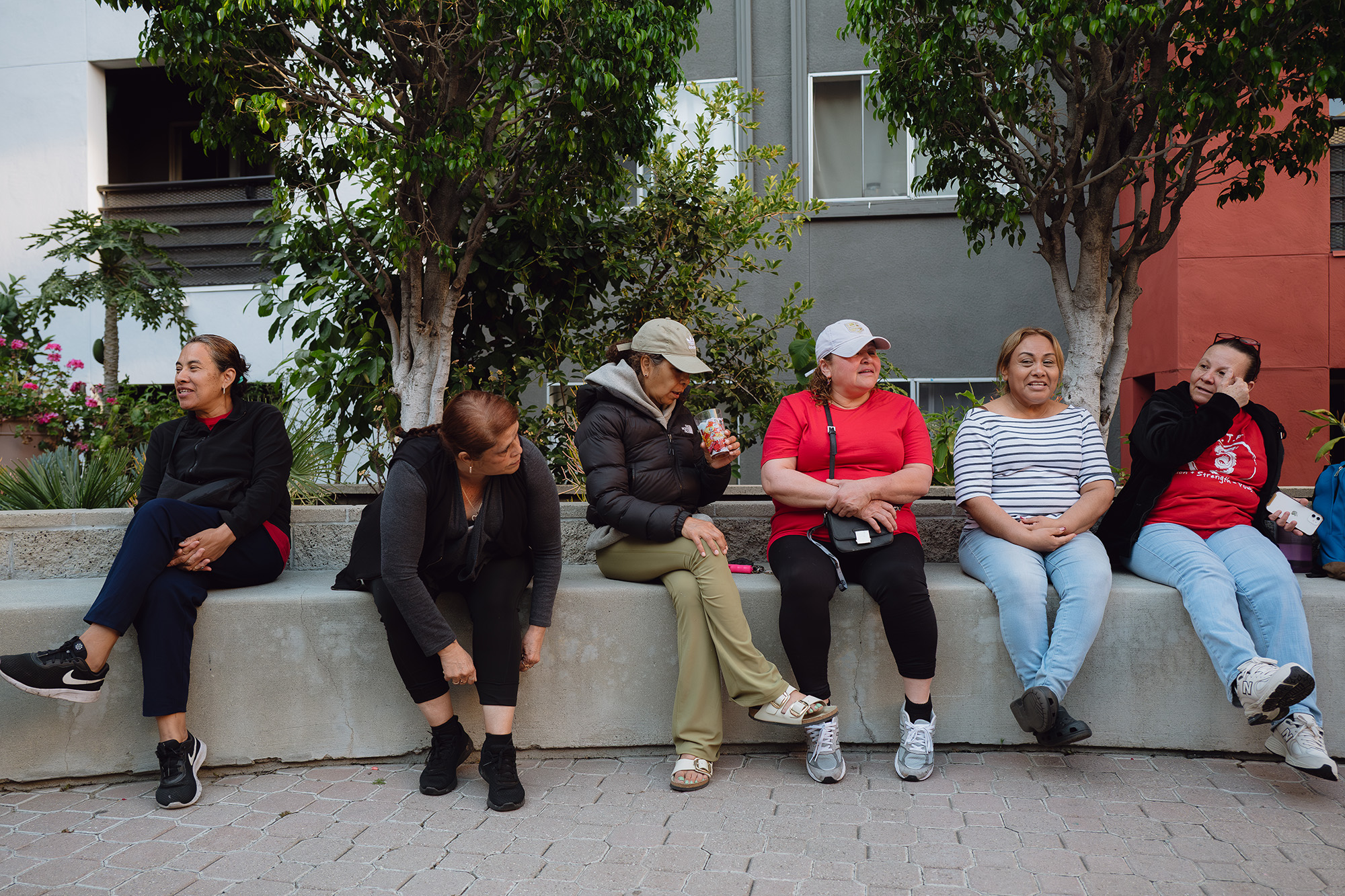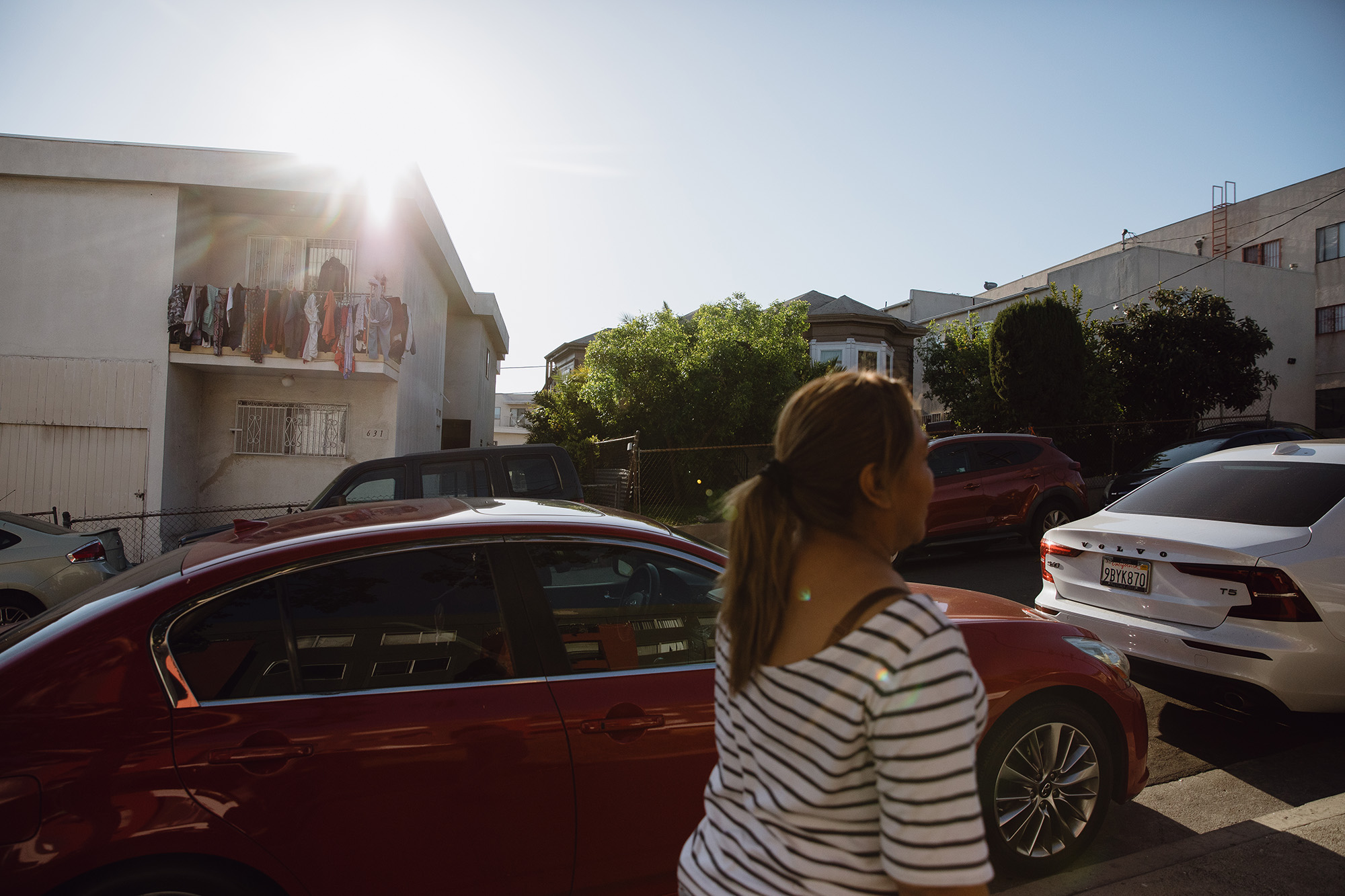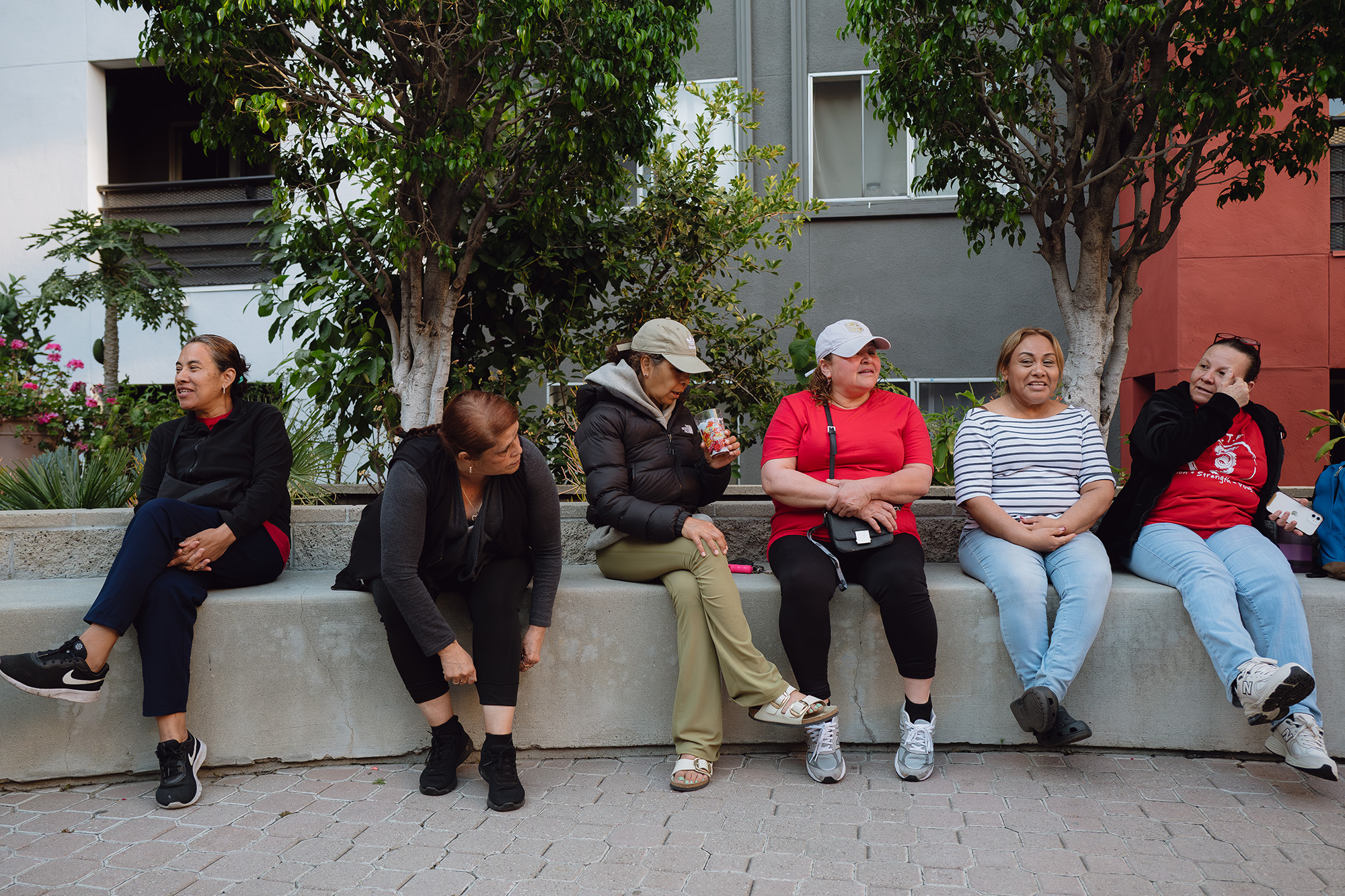In 2018, Monica Ruiz and her neighbors found letters from their landlord taped to their doors. They were notifications of rent hikes—in some cases, increases of over 200 percent.
Ruiz had lived at Hillside Villa, a large apartment complex overlooking Los Angeles’ gentrifying Chinatown, for more than 20 years. She had raised five children there. Her youngest daughter attended the nearby elementary school, where she had taken Mandarin classes since kindergarten. She didn’t want to give them up or leave her friends.
“I didn’t know how to explain it to her. I just said, ‘No, we aren’t going to move,’” Ruiz recalled.
Ruiz didn’t know if she could find another affordable home anywhere in Los Angeles. And she didn’t want to. She had long tended a community garden in the courtyard of Hillside Villa’s two L-shaped buildings that had become a gathering space for barbecues and quinceañeras, right next to the thriving papaya plants she had nurtured.
“I didn’t know how to explain it to her. I just said, ‘No, we aren’t going to move.’”
The complex had started as a triumph of Reaganomics. President Ronald Reagan demonized public housing as a budgetary blight. Through a series of reforms, his administration instead floated tax credits to incentivize private developers to build low-income housing where rents would be capped, typically for three decades or more. The policy essentially created a network of affordable housing with an expiration date, one that would kick the low-income housing can down the road to a future generation of politicians.
Lawrence Chan, the son of a billionaire Hong Kong developer, began construction on Hillside Villa in 1986 using a combination of those federal tax credits and municipal loans to fund the project. In exchange for the support, when the apartment complex opened in 1989, he agreed to a 30-year covenant with the city of Los Angeles committing to keep rents low.
Chan sold Hillside Villa in 2000. When the covenant expired in 2018, the new landlord, Tom Botz, was left with no obligation to provide affordable housing. That’s when Ruiz found the letter on her door.
Americans of most income levels and in almost every community are all too familiar with the housing crisis, pushed on by a lack of inventory and rising rents and mortgage costs. But the crisis is particularly acute among low-income people, who face a shortage of around 7.1 million affordable units, according to the National Low Income Housing Coalition. The tenants of Hillside Villa had been part of a sprawling network of over 2.6 million units whose rents are kept affordable by the federal low-income housing tax credit program, according to the National Housing Preservation Database. Over the next decade, 800,000-plus homes are slated to lose the rental restrictions set in place during Reagan’s pivot away from government-run housing.

Hillside Villa’s residents had been drawn by its low rents and quiet neighborhood. They were immigrants from Mexico, El Salvador, and Vietnam who worked as street vendors, cleaners, and construction workers. Ruiz originally wound up in the complex after being forced out of her home downtown, which was razed to make way for a convention center expansion. Adela Cortez and Rosario Hernandez had similar stories of being displaced by development. They, along with Ruiz and several other Latina women, would prove their mettle as mainstays of the tenant organizers.
“I feel completely overwhelmed by the scale of housing insecurity that we’re facing in Los Angeles.”
The residents pushed the city and their landlord to enact a 10-year covenant extension that could keep more than 100 low-income tenants housed. One morning, they even showed up outside Botz’s home in Malibu, urging him to sign. But Botz, who declined interview requests, refused, underlining a fundamental problem: When private landlords are called upon to deliver affordable housing, affordability can live and die by a landlord’s whim.
Feeling they had no other options, the tenants staged a rent strike. They called Spanish-language television stations. They held sit-ins outside local officials’ offices. They knocked on neighbors’ doors and met regularly with the LA Tenants Union and the Chinatown Community for Equitable Development.
With their back rent accumulating, the tenants pushed an unconventional solution: The city could loan itself money to buy Hillside Villa, force a sale through eminent domain, and then transfer ownership to a land trust or nonprofit that would run the complex, keep rents low, and pay the city back.

Eminent domain—the power of government to seize and redevelop property—has a bad rap, particularly in Los Angeles, where it’s been used to build freeways and stadiums and destroy working-class communities. But, the tenants reasoned, because it is a power the government can exercise in almost any situation, it could be used to save Hillside Villa from Botz and his rent increases.
The city’s Housing Department began looking into the proposal and told the city council that eminent domain would be too costly. It instead recommended a deal: The city would give Botz almost $15 million to extend the terms of the covenant for 10 more years. The tenants would pay the five years of back rent they owed, plus up to 3 percent interest, or face eviction. After the tenants said they couldn’t afford to do so, Councilmember Eunisses Hernandez, Hillside Villa’s local representative, negotiated a six-month repayment grace period and pledged to help fundraise to fill any gap, committing $250,000 from her council office.
But the tenants denounced the deal as a giveaway, leaving the standoff in place. Nithya Raman, an LA councilmember who heads its Housing and Homelessness Committee, acknowledges the extension plan is more kicking the can. “I feel completely overwhelmed by the scale of housing insecurity that we’re facing in Los Angeles,” said Raman, who was elected in 2020 after campaigning on tenant rights and the housing crisis. The deal “is only a 10-year extension,” she explains, “leaving them potentially in this exact same situation a decade later.”
Preserving existing affordable housing is just one part of the solution, according to Shane Phillips, a housing expert at UCLA’s Lewis Center for Regional Policy Studies. “It’s certainly a big problem that a lot of covenants are expiring,” he said. “It is a much bigger problem because our city, this region, has not built nearly enough housing over the past 30 or so years—relative to job growth, relative to demand, relative to just people being born.”
Last year, California’s powerful landlord lobby spent over $150 million to shut down a state proposition that would have expanded local governments’ ability to enact rent control. While LA was exploring expanding investments into housing via an existing voter-approved mansion tax last year, Mayor Karen Bass’ latest proposed budget will cut affordable housing funds to help close a $1 billion deficit.
“Our city, this region, has not built nearly enough housing over the past 30 or so years—relative to job growth, relative to demand, relative to just people being born.”
The National Low Income Housing Coalition notes that the shortage cannot be filled by states alone and that “Congress must significantly increase federal investments in programs that both preserve and expand the supply of deeply affordable units and bridge the gaps between incomes and rent.” While Rep. Alexandria Ocasio-Cortez (D-N.Y.) introduced a bill in 2024 with Sen. Tina Smith (D-Minn.) that would have created a federal agency to acquire and maintain apartment buildings for low-income Americans, since then, at least a billion dollars in federal funding for affordable housing has been axed by the Trump administration.


Last September, a Hillside Villa tenant prevailed in court against Botz, who was trying to evict him and other tenants for their ongoing rent strike; Botz dropped his related eviction cases. None of what the Hillside Villa tenants have accomplished—through the city council or in court—would’ve been possible if they hadn’t organized collectively. Now in the seventh year of their fight, they’re part of a nationally resurgent tenant movement. Last year, New York Times columnist Tressie McMillan Cottom went to Kentucky to profile the Louisville Tenants Union, which is organizing to protect tenants in a historically segregated city where politicians and developers have targeted historically Black neighborhoods for redevelopment and gentrification. This past spring, a group of Bronx tenants successfully fought their landlord over uninhabitable conditions, prompting New York City to strip his ownership of the building—a first in seven years.
Tenants unions have even started to band together. Louisville’s helped launch the Tenant Union Federation, a coalition working to win national protections. Another founder of the federation, KC Tenants of Kansas City, Missouri, began a rent strike in October. When participating members got attention on X for burning late fee notices, the Hillside Villa tenants’ account replied with a similar photo, taken in their leafy courtyard. It showed their own action, with residents wearing their signature red shirts and cheering as an eviction notice was engulfed in flame. “WE LOVE TO SEE IT,” they wrote.
This story was produced in partnership with Los Angeles Public Press. Translation and additional reporting by Martín Macías Jr.















